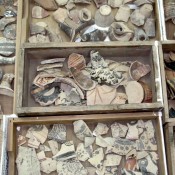The Faculty of Humanities − Amsterdam School for Heritage, Memory and Material Culture offers a PhD position in Archaeology.
Publicatiedatum: 9 september 2016
Opleidingsniveau: Universitair
Salarisindicatie: €2,174 to €2,779 gross per month, based on 38 hours per week
Sluitingsdatum: 15 oktober 2016
Functieomvang: 30,4 hours per week
Vacaturenummer: 16-429
Research at the Faculty of Humanities is carried out by six research schools under the aegis of the Amsterdam Institute of Humanities Research. The Amsterdam School for Heritage, Memory and Material Culture (AHM), one of the six research schools, currently has a vacant PhD position within the Amsterdam Centre for Ancient Studies and Archaeology (ACASA) as part of the NWO-funded VIDI-project Tracing the potter’s wheel: investigating technological trajectories and cultural encounters in the Bronze Age Aegean, led by dr. Jill Hilditch (University of Amsterdam).
Applications are now invited from excellent candidates who wish to conduct comparative research on integrated ‘digital science’ and heritage approaches for identifying wheel use in pottery production and communicating those results to the public.
Project description
Tracing the potter’s wheel will shed new light on the trajectories of technological innovations within the ancient Aegean, and offer alternative perspectives on how the humanities can address human-object-technology interactions within complex societies. The aim of the proposed project is to assess the appearance of the potter’s wheel as a technological innovation within two distinct chronological horizons of the Bronze Age Aegean: the later Early Bronze Age (ca.2500-2100BC) and the transition between the Middle and Late Bronze periods (ca.1800-1600BC). This approach uses the potter’s wheel as prism through which to investigate the transmission of craft knowledge during these two periods and the configuration of Aegean potting communities through time. A key project objective is to better understand the multi-scalar material, technological and social interactions that facilitated the transmission of the potter’s wheel in this region. To achieve this, the project will employ an integrated methodology using comparative technological, compositional and 3D analysis for distinguishing local vs. imported vessels. Digital visualization techniques will be used to refine the methodology and promote public engagement with technological approaches to material culture.
The research project consists of three interrelated subprojects: the postdoctoral (PDF) subproject Analysing the potter’s wheel: cultural encounters and technological transmission within the Bronze Age Aegean, will investigate the context of potter’s wheel adoption using frameworks that combine chaîne opératoire and “communities of practice” approaches for comparative investigations between the two chronological horizons under study. The project leader will bridge the PDF and PhD subprojects to reconstruct technological trajectories for the potter’s wheel within the Bronze Age Aegean. The PhD subproject, Visualising the potter’s wheel: developing integrated ‘digital science’ approaches for identifying wheel use in pottery production, has a three-fold focus:
1) explore and refine how archaeologists can identify wheel use within ancient assemblages;
2) provide new datasets for the regional and diachronic study of wheel invention, innovation and transmission;
3) create new arenas in which archaeologists can engage with the general public to disseminate cultural approaches to technology
The PhD candidate will integrate existing x-ray imaging and microfabric analysis of experimental and published material with 3D laser scanning technology to create digitally interactive and accessible datasets on ceramic forming techniques.
The visualization aspect of this project will be explored and communicated through interactive workshops and presentations at heritage events and museum hotspots that combine production of material culture with their technological study. Automation of identifying wheel traces will be explored, as well as the best practices for establishing an open access digital repository for research on ceramic production.
Tasks of the PhD candidate will include:
-completion and defence of a PhD thesis within four years;
-helping to establish the project website and open access database;
-creation of 3D models and visualisations for public presentation and interactive workshops;
-regular presentations of intermediate research results at workshops and conferences;
-publication of at least one peer-reviewed article;
-co-organisation of expert meetings and an international conference;
-participation in the training program of the Graduate School /research school.
Requirements
A completed (R)MA or MPhil degree in a relevant field, preferably Mediterranean Archaeology, Archaeological Materials or Heritage/Material Culture s;
excellent research skills;
experience in working with 3D scanning and visualization technologies;
proficiency in English.
Further information
For further information, please contact: dr. Jill Hilditch
Appointment
The PhD candidate will be appointed at the Faculty of Humanities at the Department of Archeology (ACASA). The appointment is for 4 years for 0,8 fte under the terms of employment currently valid for the Faculty. In the first instance, a contract will be given for 16 months, with an extension for the following 32 months on the basis of a positive evaluation. The intended starting date of the contract is 1 January 2017. The gross monthly salary will be €2,174 during the first year and €2,779 during the fourth year, based on 38 hours per week, in accordance with the Collective Labour Agreement for Dutch Universities.
Job application
Applications for the PhD positions should include in a single PDF file: a letter of motivation, stating why you want to do this research (no more than one page; a full academic CV; a list of grades obtained for your Bachelor and Master (or equivalent) programs; two letters of recommendation; a writing sample, e.g. a published paper or a chapter from your MA-thesis.
Applications may be submitted no later than 15 October 2016 by sending your application to [email protected].
No agencies please



